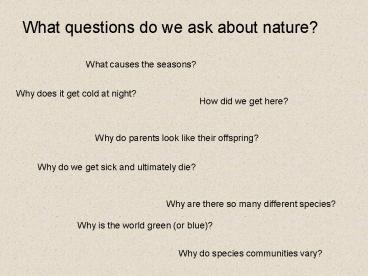A1256655771yfzOs - PowerPoint PPT Presentation
1 / 10
Title:
A1256655771yfzOs
Description:
Why do parents look like their offspring? Why do we get sick and ... It's hazardous to go off half cocked-and embarrassing to have to retract later.' Avery 1943 ... – PowerPoint PPT presentation
Number of Views:18
Avg rating:3.0/5.0
Title: A1256655771yfzOs
1
What questions do we ask about nature?
What causes the seasons?
Why does it get cold at night?
How did we get here?
Why do parents look like their offspring?
Why do we get sick and ultimately die?
Why are there so many different species?
Why is the world green (or blue)?
Why do species communities vary?
2
How can we answer these questions?
What different ways of knowing can you think of?
Why has science been so successful?
3
A method for scientific investigations
Observation
Disciplined AND creative
Question
Design experiments to test hypotheses
Generate predictions from hypotheses
Cycle continues!
Generate multiple alternative hypotheses
Compare data to predictions
Revise hypotheses
4
An example - Avery 1944
Observation Extracts from bacteria have the
ability to transform one type of bacteria into
another. This change persists over many
generations and, therefore, is due to a genetic
change. The extracts contain mainly DNA, RNA,
and proteins.
Question Which of these components carries the
genetic information that allows bacteria to be
transformed?
Hypotheses The genetic information is carried
by DNA RNA Proteins
Experiment In a series of treatments,
selectively destroy one of these components
Prediction If destroying only component A does
not abolish the transforming activity of the
extract, then component A cannot carry the
genetic information
5
Treatment Result Conclusion
Destroy RNA Active extract Reject hypothesis
Destroy proteins Active extract Reject hypothesis
Destroy DNA Inactive extract Fail to reject hypothesis
Tentative conclusion We do not have enough
evidence to rule out DNA as the genetic material
find another way to test this hypothesis!
6
Can we say that this experiment proves DNA is
the genetic material? Strong rejection of a
hypothesis Weaker evidence to support a
hypothesis Hypotheses can never be
proven. This does not mean science cannot make
progress!
7
Sounds like a virus-may be a gene. But with
mechanisms I am not now concerned-One step at a
time and the first is, what is the chemical
nature of the transforming principle? Someone
else can work out the rest. Of course, the
problem bristles with implications. Its lots of
fun to blow bubbles-but its wiser to prick them
yourself before someone else tries to. Its
hazardous to go off half cocked-and embarrassing
to have to retract later. Avery 1943
8
What questions will we address in this course?
- Why is the world so diverse?
- Geology, Biogeography
- Why are the species inhabiting the earth so
diverse? - Evolution
- How do living things persist?
- Lifes processes, inheritance
- How do living things interact with each other and
their environment? - Ecology, Behavior
- Why are humans such a dominant species and what
are the consequences? - Human evolution, behavior, ecology
9
You will see that these questions can be answered
by scientific investigation!
You will see that science is not just for
scientists anymore!
Scientific thinking is simply a good way for
everyone to ask (and answer) questions.
10
If you were to critically evaluate these claims,
what questions would you ask?































